- Clone
- K8 (See other available formats)
- Regulatory Status
- RUO
- Other Names
- Sialic acid-binding Ig-like lectin-9, CD329
- Isotype
- Mouse IgG1, κ
- Ave. Rating
- Submit a Review
- Product Citations
- publications
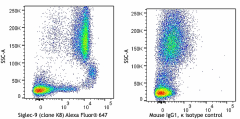
-

Human peripheral blood lymphocytes, monocytes, and granulocytes were stained with Siglec-9 (clone K8) Alexa Fluor® 647 (left) or mouse IgG1, κ isotype control Alexa Fluor® 647 (right). -

Human peripheral blood granulocytes were stained with Siglec-9 (clone K8) Alexa Fluor® 647 (filled histogram) or mouse IgG1, κ Alexa Fluor® 647 isotype control (open histogram).
| Cat # | Size | Price | Quantity Check Availability | Save | ||
|---|---|---|---|---|---|---|
| 351509 | 25 tests | $153 | ||||
| 351510 | 100 tests | $347 | ||||
Siglecs are cell surface receptors belonging to the immunoglobulin superfamily that recognize sugar antigens. The extracellular domain of siglec-9 contains an IgV region, which binds sialic acid, followed by two IgC regions. Siglec 9 and siglec 6-8,10-12 are CD33 (siglec 3) like siglecs, which have two ITIMs in the cytoplasmic tails, suggesting their functional involvement in signal transduction. It is highly expressed on neutrophils and monocytes, and at lower levels on the subpopulations of T and B lymphocytes and NK cells. Siglec-9 plays a role in negative regulation of T cell activation, and it also affects neutrophil apoptosis.
Product DetailsProduct Details
- Verified Reactivity
- Human
- Antibody Type
- Monoclonal
- Host Species
- Mouse
- Immunogen
- Recombinant Siglec-9 fused to Fc region of human IgG
- Formulation
- Phosphate-buffered solution, pH 7.2, containing 0.09% sodium azide and BSA (origin USA)
- Preparation
- The antibody was purified by affinity chromatography and conjugated with Alexa Fluor® 647 under optimal conditions.
- Concentration
- Lot-specific (to obtain lot-specific concentration and expiration, please enter the lot number in our Certificate of Analysis online tool.)
- Storage & Handling
- The antibody solution should be stored undiluted between 2°C and 8°C, and protected from prolonged exposure to light. Do not freeze.
- Application
-
FC - Quality tested
- Recommended Usage
-
Each lot of this antibody is quality control tested by immunofluorescent staining with flow cytometric analysis. For flow cytometric staining, the suggested use of this reagent is 5 µl per million cells in 100 µl staining volume or 5 µl per 100 µl of whole blood.
* Alexa Fluor® 647 has a maximum emission of 668 nm when it is excited at 633 nm / 635 nm.
Alexa Fluor® and Pacific Blue™ are trademarks of Life Technologies Corporation.
View full statement regarding label licenses - Excitation Laser
-
Red Laser (633 nm)
- Application Notes
-
Additional reported applications (for the relevant formats) include: immunofluorescence staining2, Western blotting2, immunoprecipitation2, and ELISA3.
-
Application References
(PubMed link indicates BioLegend citation) -
- Zhang J, et al. 2000. J. Biol. Chem. 275:22121.
- Avril T, et al. 2004. J. Immunol. 173:6841. (IF, IP, WB)
- Biedermann B, et al. 2007. Leukemia Res. 31:221. (ELISA)
- RRID
-
AB_2728324 (BioLegend Cat. No. 351509)
AB_2728324 (BioLegend Cat. No. 351510)
Antigen Details
- Structure
- Immunoglobulin superfamily
- Distribution
-
Highly expressed on neutrophils and monocytes, and at lower levels on the subpopulations of T cells and B lymphocytes and NK cells
- Ligand/Receptor
- Sialic acid
- Cell Type
- Monocytes, Neutrophils
- Biology Area
- Costimulatory Molecules, Immunology, Innate Immunity
- Molecular Family
- CD Molecules, Siglec Molecules
- Antigen References
-
1. Ikehara Y, et. al. 2004. J. Biol. Chem. 279:43117.
2. von Gunten S, et al. 2005. Blood 106:1423. - Gene ID
- 27180 View all products for this Gene ID
- UniProt
- View information about Siglec-9 on UniProt.org
Related Pages & Pathways
Pages
Related FAQs
Other Formats
View All Siglec-9 Reagents Request Custom Conjugation| Description | Clone | Applications |
|---|---|---|
| Purified anti-human Siglec-9 | K8 | FC,ELISA,ICC,IP,WB |
| PE anti-human Siglec-9 | K8 | FC |
| APC anti-human Siglec-9 | K8 | FC |
| Pacific Blue™ anti-human Siglec-9 | K8 | FC |
| FITC anti-human Siglec-9 | K8 | FC |
| Alexa Fluor® 647 anti-human Siglec-9 | K8 | FC |
| PE/Cyanine7 anti-human Siglec-9 | K8 | FC |
| PE/Dazzle™ 594 anti-human Siglec-9 | K8 | FC |
| APC/Fire™ 750 anti-human Siglec-9 | K8 | FC |
| PerCP/Cyanine5.5 anti-human Siglec-9 | K8 | FC |
| TotalSeq™-A1280 anti-human Siglec-9 | K8 | PG |
| TotalSeq™-B1280 anti-human Siglec-9 | K8 | PG |
| TotalSeq™-C1280 anti-human Siglec-9 | K8 | PG |
| Spark Blue™ 550 anti-human Siglec-9 (Flexi-Fluor™) | K8 | FC |
| Spark Blue™ 574 anti-human Siglec-9 (Flexi-Fluor™) Antibody | K8 | FC |
| Spark Red™ 718 anti-human Siglec-9 (Flexi-Fluor™) | K8 | FC |
Customers Also Purchased
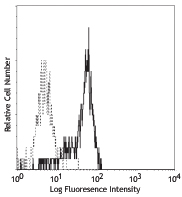
Compare Data Across All Formats
This data display is provided for general comparisons between formats.
Your actual data may vary due to variations in samples, target cells, instruments and their settings, staining conditions, and other factors.
If you need assistance with selecting the best format contact our expert technical support team.
-
Purified anti-human Siglec-9
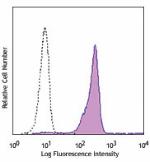
Human peripheral blood granulocytes were stained with purifi... -
PE anti-human Siglec-9
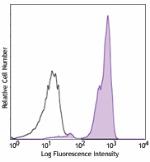
Human peripheral blood granulocytes were stained with Siglec... -
APC anti-human Siglec-9
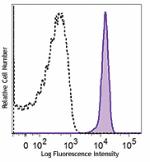
Human peripheral blood granulocytes were stained with Siglec... -
Pacific Blue™ anti-human Siglec-9
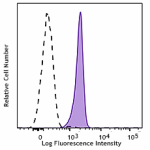
Human peripheral blood granulocytes were stained with Siglec... -
FITC anti-human Siglec-9

Human peripheral blood lymphocytes, monocytes, and granulocy... 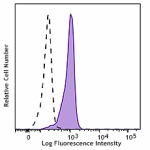
Human peripheral blood granulocytes were stained with Siglec... -
Alexa Fluor® 647 anti-human Siglec-9

Human peripheral blood lymphocytes, monocytes, and granulocy... 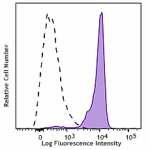
Human peripheral blood granulocytes were stained with Siglec... -
PE/Cyanine7 anti-human Siglec-9

Human peripheral blood lymphocytes, monocytes, and granulocy... 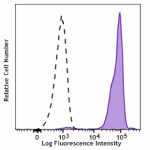
Human peripheral blood granulocytes were stained with True-S... -
PE/Dazzle™ 594 anti-human Siglec-9

Human peripheral blood lymphocytes, monocytes, and granulocy... 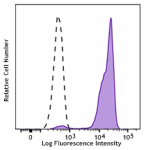
Human peripheral blood granulocytes were stained with True-S... -
APC/Fire™ 750 anti-human Siglec-9

Human peripheral blood lymphocytes, monocytes, and granulocy... 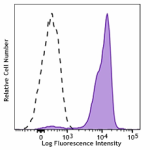
Human peripheral blood granulocytes were stained with True-S... -
PerCP/Cyanine5.5 anti-human Siglec-9

Human peripheral blood lymphocytes, monocytes, and granulocy... 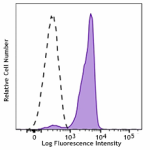
Human peripheral blood granulocytes were stained with True-S... -
TotalSeq™-A1280 anti-human Siglec-9
-
TotalSeq™-B1280 anti-human Siglec-9
-
TotalSeq™-C1280 anti-human Siglec-9
-
Spark Blue™ 550 anti-human Siglec-9 (Flexi-Fluor™)
-
Spark Blue™ 574 anti-human Siglec-9 (Flexi-Fluor™) Antibody
-
Spark Red™ 718 anti-human Siglec-9 (Flexi-Fluor™)

 Login/Register
Login/Register 










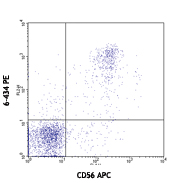
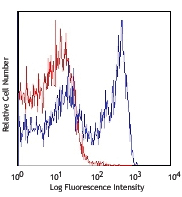



Follow Us